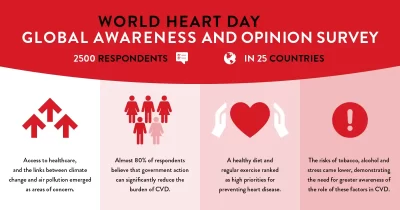World Heart Day: Prioritizing Heart Health in a Hectic World ❤️🌍
World Heart Day, celebrated worldwide on September 29th, ❤️, is dedicated to raising awareness about heart health and preventing heart-related issues. In today’s stressful life, heart problems are not limited to older adults but are increasingly affecting even young children. World Heart Day was initiated in the year 2000 by the World Heart Federation. 🌍🫁 […]
World Heart Day, celebrated worldwide on September 29th, ❤️, is dedicated to raising awareness about heart health and preventing heart-related issues. In today’s stressful life, heart problems are not limited to older adults but are increasingly affecting even young children. World Heart Day was initiated in the year 2000 by the World Heart Federation. 🌍🫁
🌍 World Heart Day is observed globally because it aims to reduce the number of deaths caused by heart diseases around the world. It is an international campaign to spread awareness and promote heart health. According to the WHO, cardiovascular diseases are the leading cause of global mortality. The most significant risk factors for heart diseases and strokes include high blood pressure, elevated cholesterol levels, increased blood sugar levels, smoking, poor diet with insufficient fruits and vegetables, excessive weight gain, and obesity. 💔🚭🍎🚶♀️ Some survey highlights:
- Access to healthcare, and the links between climate change and air pollution emerged as areas of concern.
- Almost 80% of respondents believe that government action can significantly reduce the burden of CVD.
- A healthy diet and regular exercise ranked as high priorities for preventing heart disease.
- The risks of tobacco, alcohol and stress came lower, demonstrating the need for greater awareness of the role of these factors in CVD.
To maintain a healthy heart, here are some key points to consider:
Healthy Eating 🥗:
Consume a balanced diet low in saturated fats, cholesterol, sodium, and added sugars. Incorporate fresh fruits and green vegetables into your diet. Opt for fiber-rich foods like whole grains, fish (consume fish at least two days a week), nuts, fruits, and legumes. Try to reduce meat consumption and choose low-fat or fat-free dairy products. Limit your intake of sugary and sugary items. 🍏🥦🐟
Physical Activity 🏋️♀️:
Regular exercise is essential for keeping your heart healthy. Engage in at least 150 minutes of moderate aerobic exercise (such as brisk walking) per week or at least 75 minutes of vigorous aerobic exercise (such as jogging or running). Strength training exercises for your muscles, including legs, back, chest, shoulders, and abdomen, a few days a week can also help strengthen your heart. 💪🚶♂️
Quit Smoking 🚭:
Avoid direct and passive smoking as it significantly increases the risk of heart and lung-related diseases. According to the US Surgeon General’s report, people who smoke indirectly (secondhand smoke) are at up to 30% higher risk of heart and lung diseases than direct smokers. 🚫🚬
Family History 👨👩👧👦:
If someone in your family has had heart-related issues, you may be at risk as well. Understanding your family history can help you take preventive measures. Keep your weight in check, engage in regular physical activity, avoid smoking, and consume a healthy diet. Additionally, get regular check-ups for your heart. ❤️👩⚕️
Stress Management 🧘♂️:
Stress is a major enemy of your heart health. Try to manage stress through deep breathing exercises, yoga, and meditation. Stress can increase your heart rate and blood pressure, potentially damaging your arteries. ☮️😌
Blood Sugar Check 🩸:
Regularly monitor your blood sugar levels. After the age of 45, it is essential to get your blood sugar checked regularly. If you are overweight, have diabetes, or are at risk of developing diabetes, it’s advisable to monitor your blood sugar levels more frequently. Maintaining a healthy diet and exercise routine can help control blood sugar levels. 📊🍰
Sleep Quality 😴:
If your partner complains of snoring at night, don’t ignore it. Snoring may indicate breathing difficulties, which can affect your heart health. Maintaining a healthy weight and practicing good sleeping habits can help improve sleep quality. 🌙💤
Ankle-Brachial Index (ABI) Test 🦵📏:
After the age of 60, consider getting an ABI test done every year or every two years. This test can help diagnose peripheral artery disease (PAD), which increases the risk of cardiovascular diseases. 🏥📋 
Weight Management ⚖️:
Keeping your weight within a healthy range is crucial for heart health. Your Body Mass Index (BMI) should be below 25. You can calculate your BMI by dividing your weight in kilograms by the square of your height in meters. Avoid excessive use of oils and opt for low-residue grains and high-fiber salads to control your weight. 🍽️🏋️♀️
Stroll Around 🚶♂️:
Take a 15-minute leisurely walk every day. The walking pace should be such that it doesn’t cause discomfort in your chest, and you don’t get out of breath. This can help boost your good cholesterol (HDL cholesterol) levels and improve overall cardiovascular health. 🌳🚶♀️❤️
By following these guidelines and taking steps to maintain a healthy lifestyle, you can significantly reduce the risk of heart-related diseases and promote overall well-being. ❤️🏃♀️🥗 #WorldHeartDay






प्रातिक्रिया दे